Exploring Unemployment's Impact on Aboriginal Health
VerifiedAdded on 2023/03/17
|16
|5079
|88
Essay
AI Summary
This essay delves into the global perspective of social determinants of health, focusing on unemployment's impact on the Aboriginal and Torres Strait Islander peoples of Australia. The paper highlights the significantly higher unemployment rates within this population compared to non-indigenous Australians, linking this disparity to poorer health outcomes, including reduced life expectancy, higher rates of infant mortality, and increased prevalence of chronic diseases. The essay analyzes the multifaceted consequences of unemployment, such as psychological problems, reduced literacy levels, and challenges in accessing healthcare, including the inability to afford hospital bills. The author then discusses the impact of unemployment on Aboriginal and Torres Strait Islander people, including the development of mental health issues like depression, anxiety, and sleep disorders, and the negative effects on education, limiting access to health information and well-paying jobs. The paper also explores how unemployment undermines the development of healthcare institutions in indigenous territories. Finally, the essay underscores the need for strategies to address the health complications linked to unemployment among the Aboriginal and Torres Strait Islander peoples of Australia.
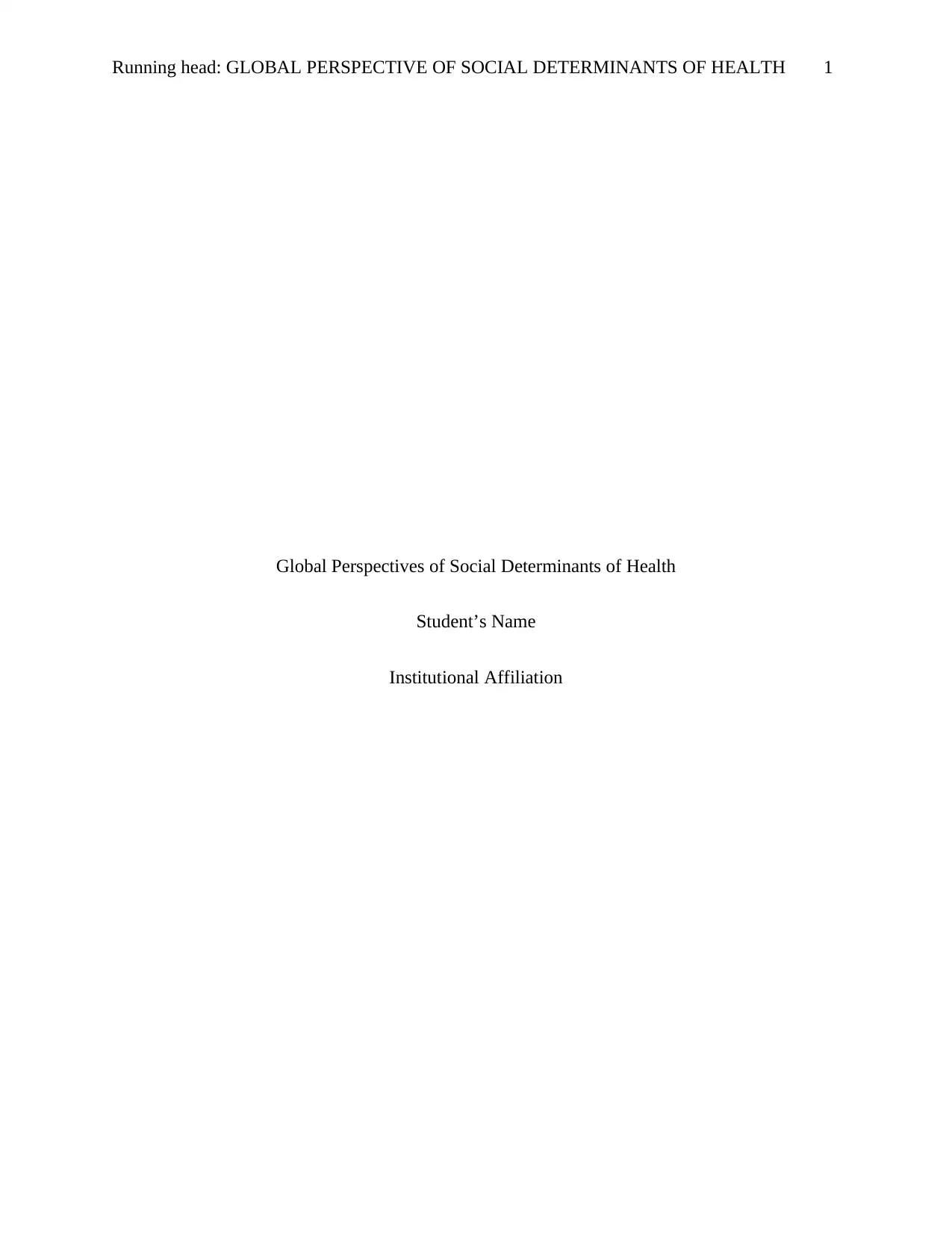
Running head: GLOBAL PERSPECTIVE OF SOCIAL DETERMINANTS OF HEALTH 1
Global Perspectives of Social Determinants of Health
Student’s Name
Institutional Affiliation
Global Perspectives of Social Determinants of Health
Student’s Name
Institutional Affiliation
Paraphrase This Document
Need a fresh take? Get an instant paraphrase of this document with our AI Paraphraser
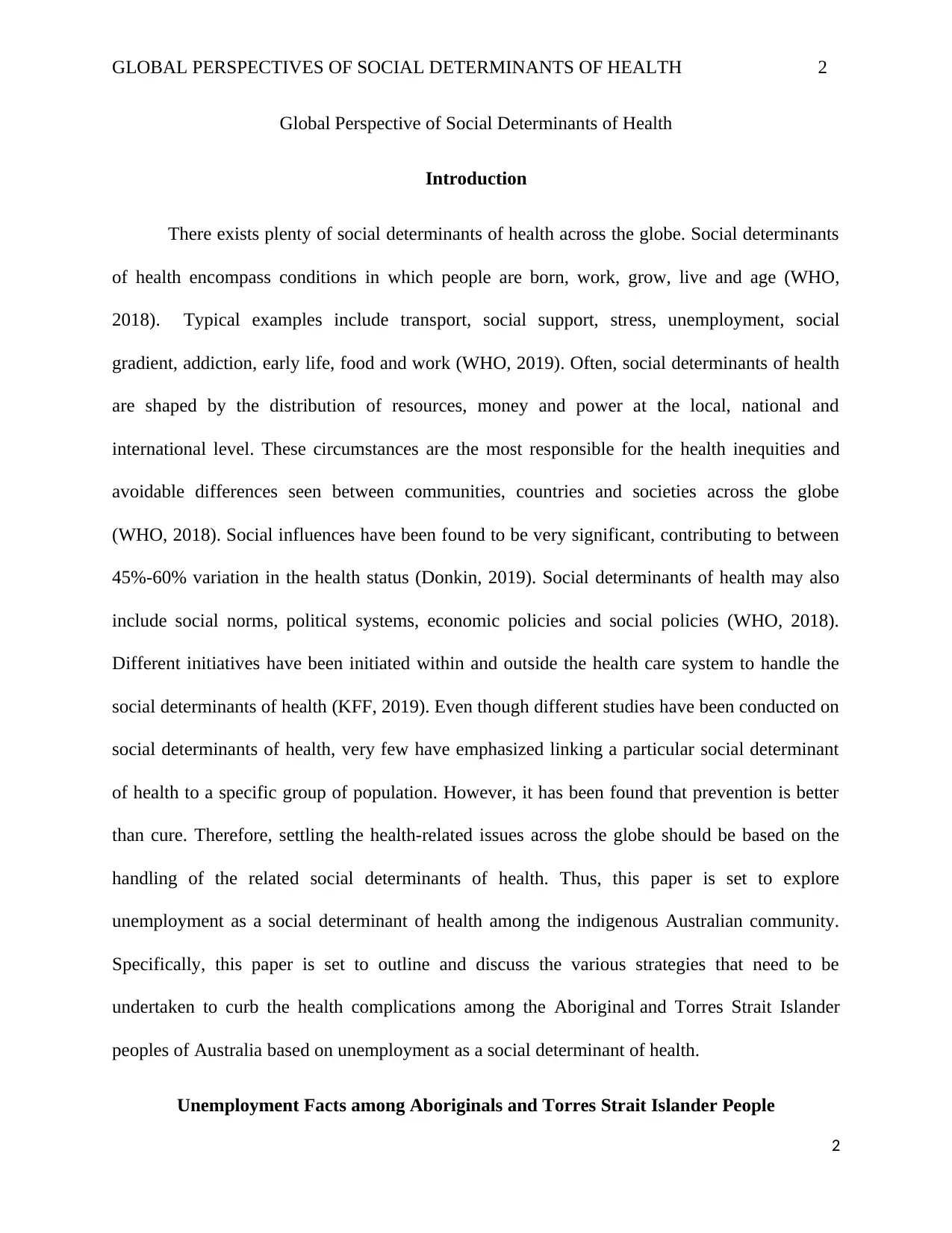
GLOBAL PERSPECTIVES OF SOCIAL DETERMINANTS OF HEALTH 2
Global Perspective of Social Determinants of Health
Introduction
There exists plenty of social determinants of health across the globe. Social determinants
of health encompass conditions in which people are born, work, grow, live and age (WHO,
2018). Typical examples include transport, social support, stress, unemployment, social
gradient, addiction, early life, food and work (WHO, 2019). Often, social determinants of health
are shaped by the distribution of resources, money and power at the local, national and
international level. These circumstances are the most responsible for the health inequities and
avoidable differences seen between communities, countries and societies across the globe
(WHO, 2018). Social influences have been found to be very significant, contributing to between
45%-60% variation in the health status (Donkin, 2019). Social determinants of health may also
include social norms, political systems, economic policies and social policies (WHO, 2018).
Different initiatives have been initiated within and outside the health care system to handle the
social determinants of health (KFF, 2019). Even though different studies have been conducted on
social determinants of health, very few have emphasized linking a particular social determinant
of health to a specific group of population. However, it has been found that prevention is better
than cure. Therefore, settling the health-related issues across the globe should be based on the
handling of the related social determinants of health. Thus, this paper is set to explore
unemployment as a social determinant of health among the indigenous Australian community.
Specifically, this paper is set to outline and discuss the various strategies that need to be
undertaken to curb the health complications among the Aboriginal and Torres Strait Islander
peoples of Australia based on unemployment as a social determinant of health.
Unemployment Facts among Aboriginals and Torres Strait Islander People
2
Global Perspective of Social Determinants of Health
Introduction
There exists plenty of social determinants of health across the globe. Social determinants
of health encompass conditions in which people are born, work, grow, live and age (WHO,
2018). Typical examples include transport, social support, stress, unemployment, social
gradient, addiction, early life, food and work (WHO, 2019). Often, social determinants of health
are shaped by the distribution of resources, money and power at the local, national and
international level. These circumstances are the most responsible for the health inequities and
avoidable differences seen between communities, countries and societies across the globe
(WHO, 2018). Social influences have been found to be very significant, contributing to between
45%-60% variation in the health status (Donkin, 2019). Social determinants of health may also
include social norms, political systems, economic policies and social policies (WHO, 2018).
Different initiatives have been initiated within and outside the health care system to handle the
social determinants of health (KFF, 2019). Even though different studies have been conducted on
social determinants of health, very few have emphasized linking a particular social determinant
of health to a specific group of population. However, it has been found that prevention is better
than cure. Therefore, settling the health-related issues across the globe should be based on the
handling of the related social determinants of health. Thus, this paper is set to explore
unemployment as a social determinant of health among the indigenous Australian community.
Specifically, this paper is set to outline and discuss the various strategies that need to be
undertaken to curb the health complications among the Aboriginal and Torres Strait Islander
peoples of Australia based on unemployment as a social determinant of health.
Unemployment Facts among Aboriginals and Torres Strait Islander People
2
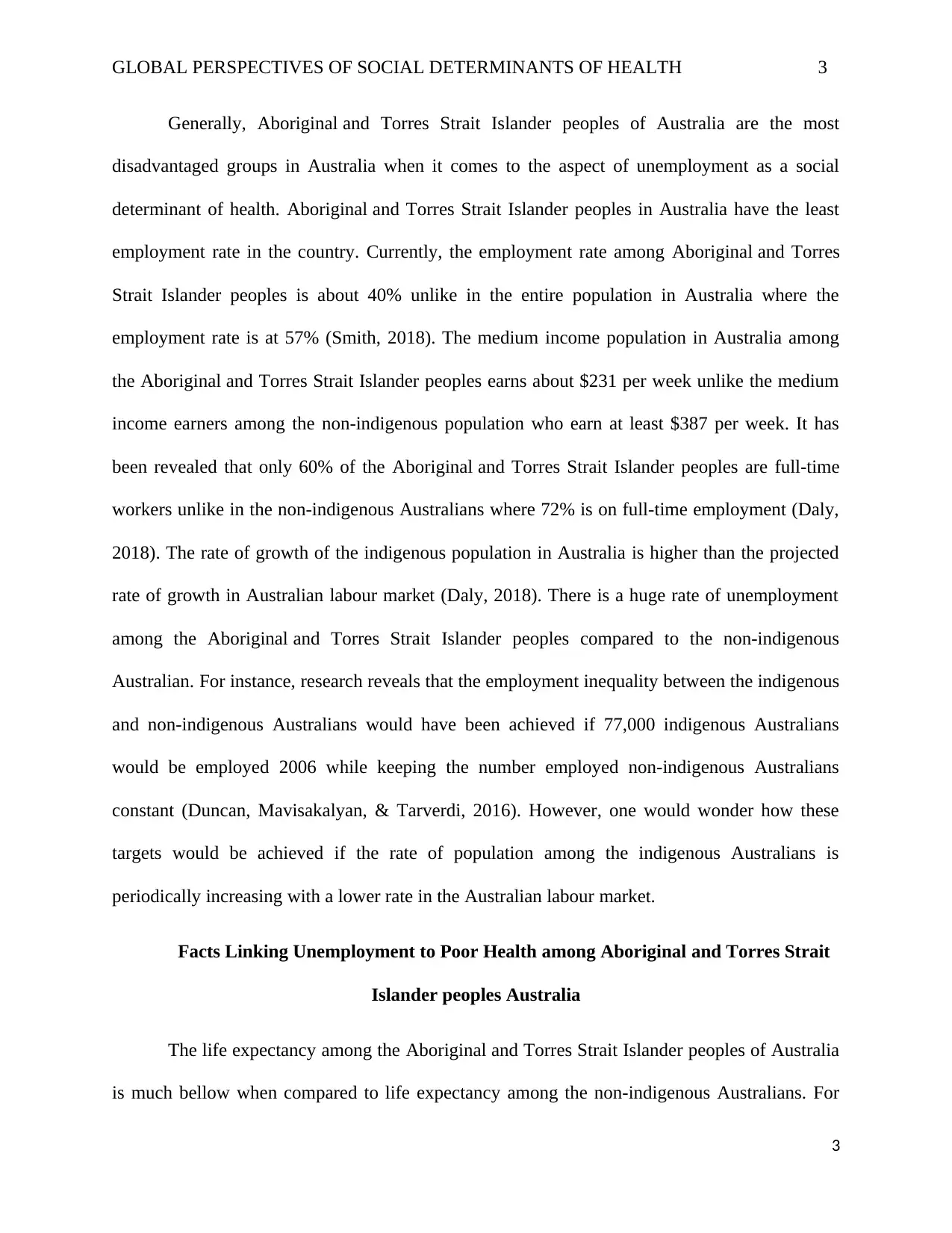
GLOBAL PERSPECTIVES OF SOCIAL DETERMINANTS OF HEALTH 3
Generally, Aboriginal and Torres Strait Islander peoples of Australia are the most
disadvantaged groups in Australia when it comes to the aspect of unemployment as a social
determinant of health. Aboriginal and Torres Strait Islander peoples in Australia have the least
employment rate in the country. Currently, the employment rate among Aboriginal and Torres
Strait Islander peoples is about 40% unlike in the entire population in Australia where the
employment rate is at 57% (Smith, 2018). The medium income population in Australia among
the Aboriginal and Torres Strait Islander peoples earns about $231 per week unlike the medium
income earners among the non-indigenous population who earn at least $387 per week. It has
been revealed that only 60% of the Aboriginal and Torres Strait Islander peoples are full-time
workers unlike in the non-indigenous Australians where 72% is on full-time employment (Daly,
2018). The rate of growth of the indigenous population in Australia is higher than the projected
rate of growth in Australian labour market (Daly, 2018). There is a huge rate of unemployment
among the Aboriginal and Torres Strait Islander peoples compared to the non-indigenous
Australian. For instance, research reveals that the employment inequality between the indigenous
and non-indigenous Australians would have been achieved if 77,000 indigenous Australians
would be employed 2006 while keeping the number employed non-indigenous Australians
constant (Duncan, Mavisakalyan, & Tarverdi, 2016). However, one would wonder how these
targets would be achieved if the rate of population among the indigenous Australians is
periodically increasing with a lower rate in the Australian labour market.
Facts Linking Unemployment to Poor Health among Aboriginal and Torres Strait
Islander peoples Australia
The life expectancy among the Aboriginal and Torres Strait Islander peoples of Australia
is much bellow when compared to life expectancy among the non-indigenous Australians. For
3
Generally, Aboriginal and Torres Strait Islander peoples of Australia are the most
disadvantaged groups in Australia when it comes to the aspect of unemployment as a social
determinant of health. Aboriginal and Torres Strait Islander peoples in Australia have the least
employment rate in the country. Currently, the employment rate among Aboriginal and Torres
Strait Islander peoples is about 40% unlike in the entire population in Australia where the
employment rate is at 57% (Smith, 2018). The medium income population in Australia among
the Aboriginal and Torres Strait Islander peoples earns about $231 per week unlike the medium
income earners among the non-indigenous population who earn at least $387 per week. It has
been revealed that only 60% of the Aboriginal and Torres Strait Islander peoples are full-time
workers unlike in the non-indigenous Australians where 72% is on full-time employment (Daly,
2018). The rate of growth of the indigenous population in Australia is higher than the projected
rate of growth in Australian labour market (Daly, 2018). There is a huge rate of unemployment
among the Aboriginal and Torres Strait Islander peoples compared to the non-indigenous
Australian. For instance, research reveals that the employment inequality between the indigenous
and non-indigenous Australians would have been achieved if 77,000 indigenous Australians
would be employed 2006 while keeping the number employed non-indigenous Australians
constant (Duncan, Mavisakalyan, & Tarverdi, 2016). However, one would wonder how these
targets would be achieved if the rate of population among the indigenous Australians is
periodically increasing with a lower rate in the Australian labour market.
Facts Linking Unemployment to Poor Health among Aboriginal and Torres Strait
Islander peoples Australia
The life expectancy among the Aboriginal and Torres Strait Islander peoples of Australia
is much bellow when compared to life expectancy among the non-indigenous Australians. For
3
⊘ This is a preview!⊘
Do you want full access?
Subscribe today to unlock all pages.

Trusted by 1+ million students worldwide
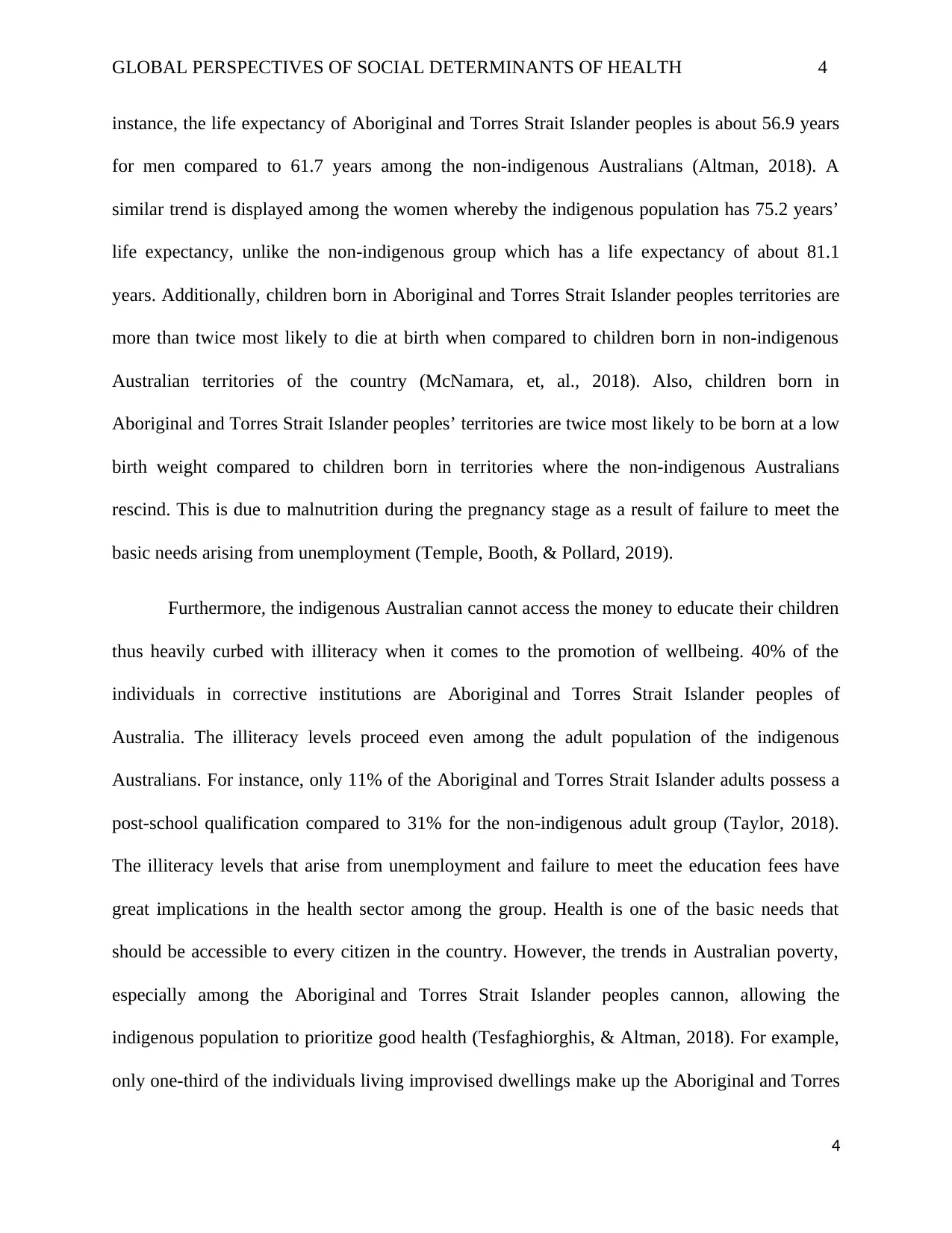
GLOBAL PERSPECTIVES OF SOCIAL DETERMINANTS OF HEALTH 4
instance, the life expectancy of Aboriginal and Torres Strait Islander peoples is about 56.9 years
for men compared to 61.7 years among the non-indigenous Australians (Altman, 2018). A
similar trend is displayed among the women whereby the indigenous population has 75.2 years’
life expectancy, unlike the non-indigenous group which has a life expectancy of about 81.1
years. Additionally, children born in Aboriginal and Torres Strait Islander peoples territories are
more than twice most likely to die at birth when compared to children born in non-indigenous
Australian territories of the country (McNamara, et, al., 2018). Also, children born in
Aboriginal and Torres Strait Islander peoples’ territories are twice most likely to be born at a low
birth weight compared to children born in territories where the non-indigenous Australians
rescind. This is due to malnutrition during the pregnancy stage as a result of failure to meet the
basic needs arising from unemployment (Temple, Booth, & Pollard, 2019).
Furthermore, the indigenous Australian cannot access the money to educate their children
thus heavily curbed with illiteracy when it comes to the promotion of wellbeing. 40% of the
individuals in corrective institutions are Aboriginal and Torres Strait Islander peoples of
Australia. The illiteracy levels proceed even among the adult population of the indigenous
Australians. For instance, only 11% of the Aboriginal and Torres Strait Islander adults possess a
post-school qualification compared to 31% for the non-indigenous adult group (Taylor, 2018).
The illiteracy levels that arise from unemployment and failure to meet the education fees have
great implications in the health sector among the group. Health is one of the basic needs that
should be accessible to every citizen in the country. However, the trends in Australian poverty,
especially among the Aboriginal and Torres Strait Islander peoples cannon, allowing the
indigenous population to prioritize good health (Tesfaghiorghis, & Altman, 2018). For example,
only one-third of the individuals living improvised dwellings make up the Aboriginal and Torres
4
instance, the life expectancy of Aboriginal and Torres Strait Islander peoples is about 56.9 years
for men compared to 61.7 years among the non-indigenous Australians (Altman, 2018). A
similar trend is displayed among the women whereby the indigenous population has 75.2 years’
life expectancy, unlike the non-indigenous group which has a life expectancy of about 81.1
years. Additionally, children born in Aboriginal and Torres Strait Islander peoples territories are
more than twice most likely to die at birth when compared to children born in non-indigenous
Australian territories of the country (McNamara, et, al., 2018). Also, children born in
Aboriginal and Torres Strait Islander peoples’ territories are twice most likely to be born at a low
birth weight compared to children born in territories where the non-indigenous Australians
rescind. This is due to malnutrition during the pregnancy stage as a result of failure to meet the
basic needs arising from unemployment (Temple, Booth, & Pollard, 2019).
Furthermore, the indigenous Australian cannot access the money to educate their children
thus heavily curbed with illiteracy when it comes to the promotion of wellbeing. 40% of the
individuals in corrective institutions are Aboriginal and Torres Strait Islander peoples of
Australia. The illiteracy levels proceed even among the adult population of the indigenous
Australians. For instance, only 11% of the Aboriginal and Torres Strait Islander adults possess a
post-school qualification compared to 31% for the non-indigenous adult group (Taylor, 2018).
The illiteracy levels that arise from unemployment and failure to meet the education fees have
great implications in the health sector among the group. Health is one of the basic needs that
should be accessible to every citizen in the country. However, the trends in Australian poverty,
especially among the Aboriginal and Torres Strait Islander peoples cannon, allowing the
indigenous population to prioritize good health (Tesfaghiorghis, & Altman, 2018). For example,
only one-third of the individuals living improvised dwellings make up the Aboriginal and Torres
4
Paraphrase This Document
Need a fresh take? Get an instant paraphrase of this document with our AI Paraphraser
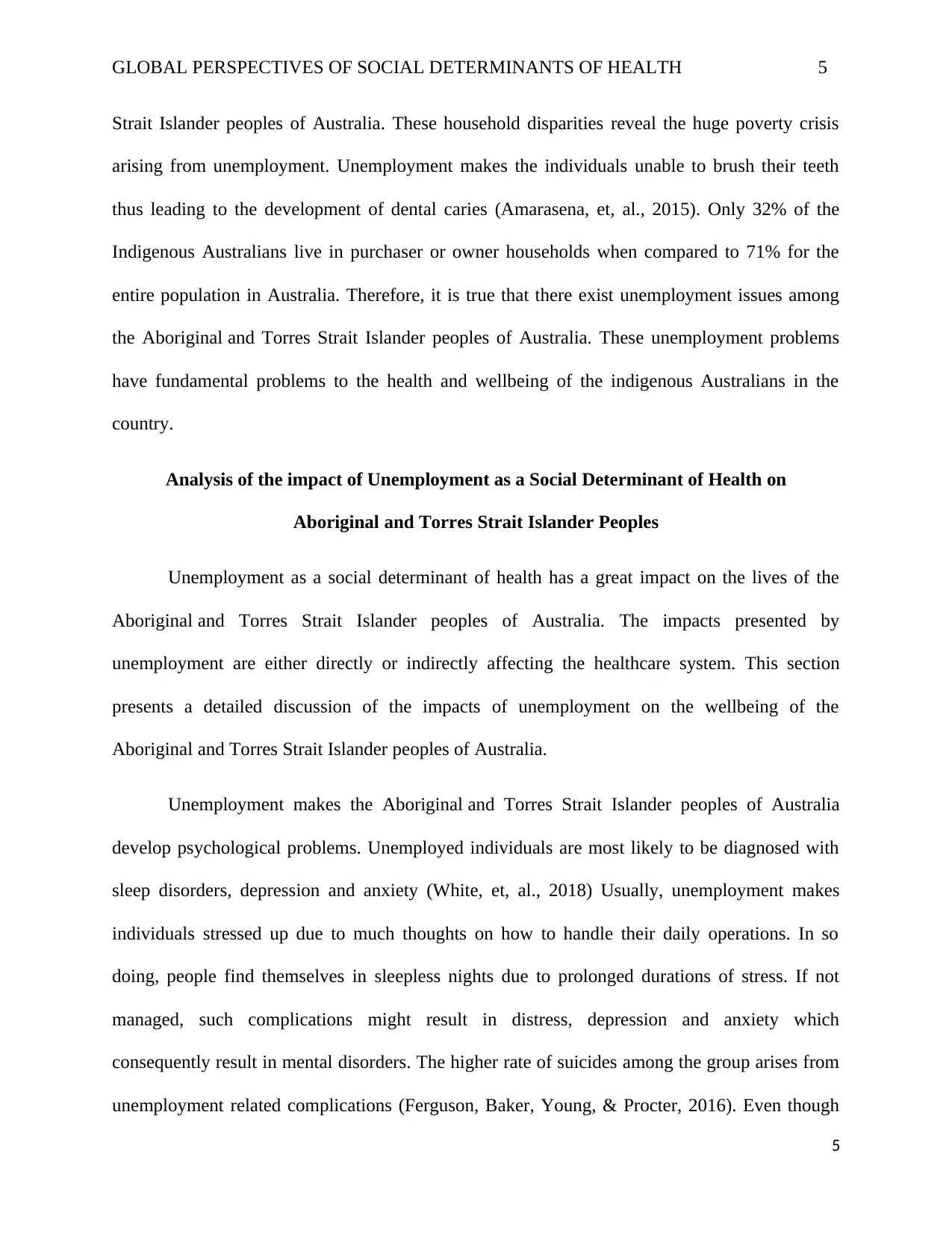
GLOBAL PERSPECTIVES OF SOCIAL DETERMINANTS OF HEALTH 5
Strait Islander peoples of Australia. These household disparities reveal the huge poverty crisis
arising from unemployment. Unemployment makes the individuals unable to brush their teeth
thus leading to the development of dental caries (Amarasena, et, al., 2015). Only 32% of the
Indigenous Australians live in purchaser or owner households when compared to 71% for the
entire population in Australia. Therefore, it is true that there exist unemployment issues among
the Aboriginal and Torres Strait Islander peoples of Australia. These unemployment problems
have fundamental problems to the health and wellbeing of the indigenous Australians in the
country.
Analysis of the impact of Unemployment as a Social Determinant of Health on
Aboriginal and Torres Strait Islander Peoples
Unemployment as a social determinant of health has a great impact on the lives of the
Aboriginal and Torres Strait Islander peoples of Australia. The impacts presented by
unemployment are either directly or indirectly affecting the healthcare system. This section
presents a detailed discussion of the impacts of unemployment on the wellbeing of the
Aboriginal and Torres Strait Islander peoples of Australia.
Unemployment makes the Aboriginal and Torres Strait Islander peoples of Australia
develop psychological problems. Unemployed individuals are most likely to be diagnosed with
sleep disorders, depression and anxiety (White, et, al., 2018) Usually, unemployment makes
individuals stressed up due to much thoughts on how to handle their daily operations. In so
doing, people find themselves in sleepless nights due to prolonged durations of stress. If not
managed, such complications might result in distress, depression and anxiety which
consequently result in mental disorders. The higher rate of suicides among the group arises from
unemployment related complications (Ferguson, Baker, Young, & Procter, 2016). Even though
5
Strait Islander peoples of Australia. These household disparities reveal the huge poverty crisis
arising from unemployment. Unemployment makes the individuals unable to brush their teeth
thus leading to the development of dental caries (Amarasena, et, al., 2015). Only 32% of the
Indigenous Australians live in purchaser or owner households when compared to 71% for the
entire population in Australia. Therefore, it is true that there exist unemployment issues among
the Aboriginal and Torres Strait Islander peoples of Australia. These unemployment problems
have fundamental problems to the health and wellbeing of the indigenous Australians in the
country.
Analysis of the impact of Unemployment as a Social Determinant of Health on
Aboriginal and Torres Strait Islander Peoples
Unemployment as a social determinant of health has a great impact on the lives of the
Aboriginal and Torres Strait Islander peoples of Australia. The impacts presented by
unemployment are either directly or indirectly affecting the healthcare system. This section
presents a detailed discussion of the impacts of unemployment on the wellbeing of the
Aboriginal and Torres Strait Islander peoples of Australia.
Unemployment makes the Aboriginal and Torres Strait Islander peoples of Australia
develop psychological problems. Unemployed individuals are most likely to be diagnosed with
sleep disorders, depression and anxiety (White, et, al., 2018) Usually, unemployment makes
individuals stressed up due to much thoughts on how to handle their daily operations. In so
doing, people find themselves in sleepless nights due to prolonged durations of stress. If not
managed, such complications might result in distress, depression and anxiety which
consequently result in mental disorders. The higher rate of suicides among the group arises from
unemployment related complications (Ferguson, Baker, Young, & Procter, 2016). Even though
5
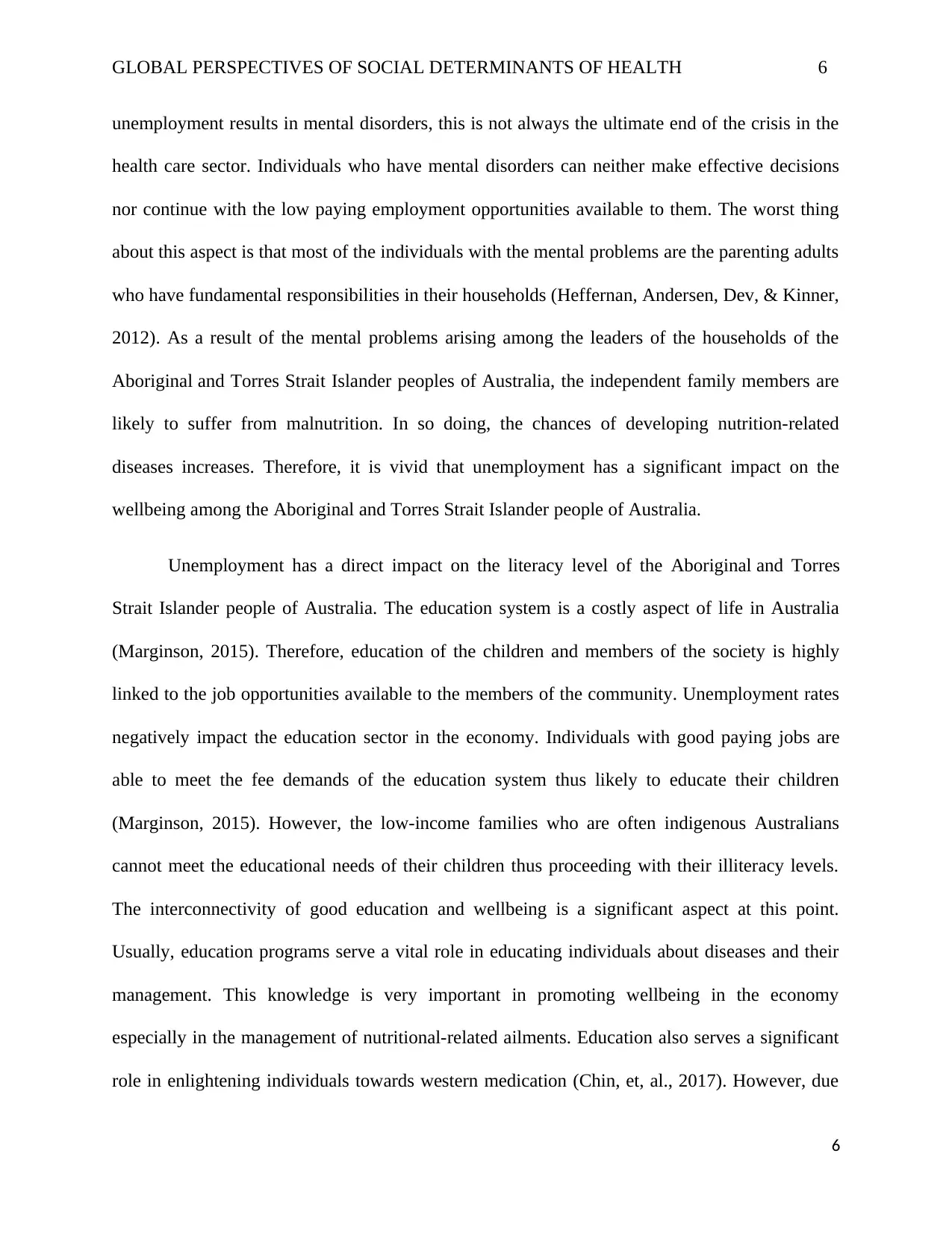
GLOBAL PERSPECTIVES OF SOCIAL DETERMINANTS OF HEALTH 6
unemployment results in mental disorders, this is not always the ultimate end of the crisis in the
health care sector. Individuals who have mental disorders can neither make effective decisions
nor continue with the low paying employment opportunities available to them. The worst thing
about this aspect is that most of the individuals with the mental problems are the parenting adults
who have fundamental responsibilities in their households (Heffernan, Andersen, Dev, & Kinner,
2012). As a result of the mental problems arising among the leaders of the households of the
Aboriginal and Torres Strait Islander peoples of Australia, the independent family members are
likely to suffer from malnutrition. In so doing, the chances of developing nutrition-related
diseases increases. Therefore, it is vivid that unemployment has a significant impact on the
wellbeing among the Aboriginal and Torres Strait Islander people of Australia.
Unemployment has a direct impact on the literacy level of the Aboriginal and Torres
Strait Islander people of Australia. The education system is a costly aspect of life in Australia
(Marginson, 2015). Therefore, education of the children and members of the society is highly
linked to the job opportunities available to the members of the community. Unemployment rates
negatively impact the education sector in the economy. Individuals with good paying jobs are
able to meet the fee demands of the education system thus likely to educate their children
(Marginson, 2015). However, the low-income families who are often indigenous Australians
cannot meet the educational needs of their children thus proceeding with their illiteracy levels.
The interconnectivity of good education and wellbeing is a significant aspect at this point.
Usually, education programs serve a vital role in educating individuals about diseases and their
management. This knowledge is very important in promoting wellbeing in the economy
especially in the management of nutritional-related ailments. Education also serves a significant
role in enlightening individuals towards western medication (Chin, et, al., 2017). However, due
6
unemployment results in mental disorders, this is not always the ultimate end of the crisis in the
health care sector. Individuals who have mental disorders can neither make effective decisions
nor continue with the low paying employment opportunities available to them. The worst thing
about this aspect is that most of the individuals with the mental problems are the parenting adults
who have fundamental responsibilities in their households (Heffernan, Andersen, Dev, & Kinner,
2012). As a result of the mental problems arising among the leaders of the households of the
Aboriginal and Torres Strait Islander peoples of Australia, the independent family members are
likely to suffer from malnutrition. In so doing, the chances of developing nutrition-related
diseases increases. Therefore, it is vivid that unemployment has a significant impact on the
wellbeing among the Aboriginal and Torres Strait Islander people of Australia.
Unemployment has a direct impact on the literacy level of the Aboriginal and Torres
Strait Islander people of Australia. The education system is a costly aspect of life in Australia
(Marginson, 2015). Therefore, education of the children and members of the society is highly
linked to the job opportunities available to the members of the community. Unemployment rates
negatively impact the education sector in the economy. Individuals with good paying jobs are
able to meet the fee demands of the education system thus likely to educate their children
(Marginson, 2015). However, the low-income families who are often indigenous Australians
cannot meet the educational needs of their children thus proceeding with their illiteracy levels.
The interconnectivity of good education and wellbeing is a significant aspect at this point.
Usually, education programs serve a vital role in educating individuals about diseases and their
management. This knowledge is very important in promoting wellbeing in the economy
especially in the management of nutritional-related ailments. Education also serves a significant
role in enlightening individuals towards western medication (Chin, et, al., 2017). However, due
6
⊘ This is a preview!⊘
Do you want full access?
Subscribe today to unlock all pages.

Trusted by 1+ million students worldwide
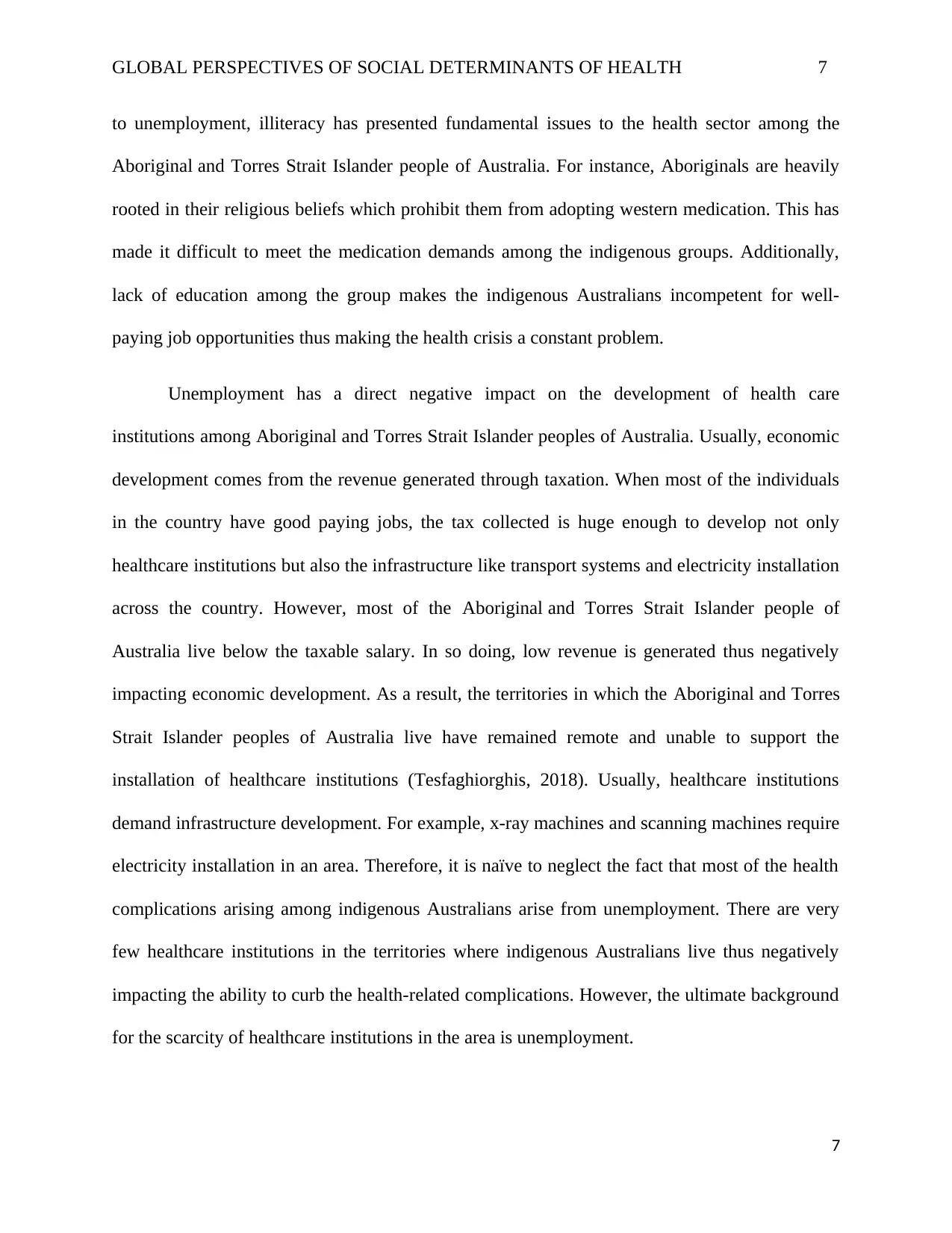
GLOBAL PERSPECTIVES OF SOCIAL DETERMINANTS OF HEALTH 7
to unemployment, illiteracy has presented fundamental issues to the health sector among the
Aboriginal and Torres Strait Islander people of Australia. For instance, Aboriginals are heavily
rooted in their religious beliefs which prohibit them from adopting western medication. This has
made it difficult to meet the medication demands among the indigenous groups. Additionally,
lack of education among the group makes the indigenous Australians incompetent for well-
paying job opportunities thus making the health crisis a constant problem.
Unemployment has a direct negative impact on the development of health care
institutions among Aboriginal and Torres Strait Islander peoples of Australia. Usually, economic
development comes from the revenue generated through taxation. When most of the individuals
in the country have good paying jobs, the tax collected is huge enough to develop not only
healthcare institutions but also the infrastructure like transport systems and electricity installation
across the country. However, most of the Aboriginal and Torres Strait Islander people of
Australia live below the taxable salary. In so doing, low revenue is generated thus negatively
impacting economic development. As a result, the territories in which the Aboriginal and Torres
Strait Islander peoples of Australia live have remained remote and unable to support the
installation of healthcare institutions (Tesfaghiorghis, 2018). Usually, healthcare institutions
demand infrastructure development. For example, x-ray machines and scanning machines require
electricity installation in an area. Therefore, it is naïve to neglect the fact that most of the health
complications arising among indigenous Australians arise from unemployment. There are very
few healthcare institutions in the territories where indigenous Australians live thus negatively
impacting the ability to curb the health-related complications. However, the ultimate background
for the scarcity of healthcare institutions in the area is unemployment.
7
to unemployment, illiteracy has presented fundamental issues to the health sector among the
Aboriginal and Torres Strait Islander people of Australia. For instance, Aboriginals are heavily
rooted in their religious beliefs which prohibit them from adopting western medication. This has
made it difficult to meet the medication demands among the indigenous groups. Additionally,
lack of education among the group makes the indigenous Australians incompetent for well-
paying job opportunities thus making the health crisis a constant problem.
Unemployment has a direct negative impact on the development of health care
institutions among Aboriginal and Torres Strait Islander peoples of Australia. Usually, economic
development comes from the revenue generated through taxation. When most of the individuals
in the country have good paying jobs, the tax collected is huge enough to develop not only
healthcare institutions but also the infrastructure like transport systems and electricity installation
across the country. However, most of the Aboriginal and Torres Strait Islander people of
Australia live below the taxable salary. In so doing, low revenue is generated thus negatively
impacting economic development. As a result, the territories in which the Aboriginal and Torres
Strait Islander peoples of Australia live have remained remote and unable to support the
installation of healthcare institutions (Tesfaghiorghis, 2018). Usually, healthcare institutions
demand infrastructure development. For example, x-ray machines and scanning machines require
electricity installation in an area. Therefore, it is naïve to neglect the fact that most of the health
complications arising among indigenous Australians arise from unemployment. There are very
few healthcare institutions in the territories where indigenous Australians live thus negatively
impacting the ability to curb the health-related complications. However, the ultimate background
for the scarcity of healthcare institutions in the area is unemployment.
7
Paraphrase This Document
Need a fresh take? Get an instant paraphrase of this document with our AI Paraphraser
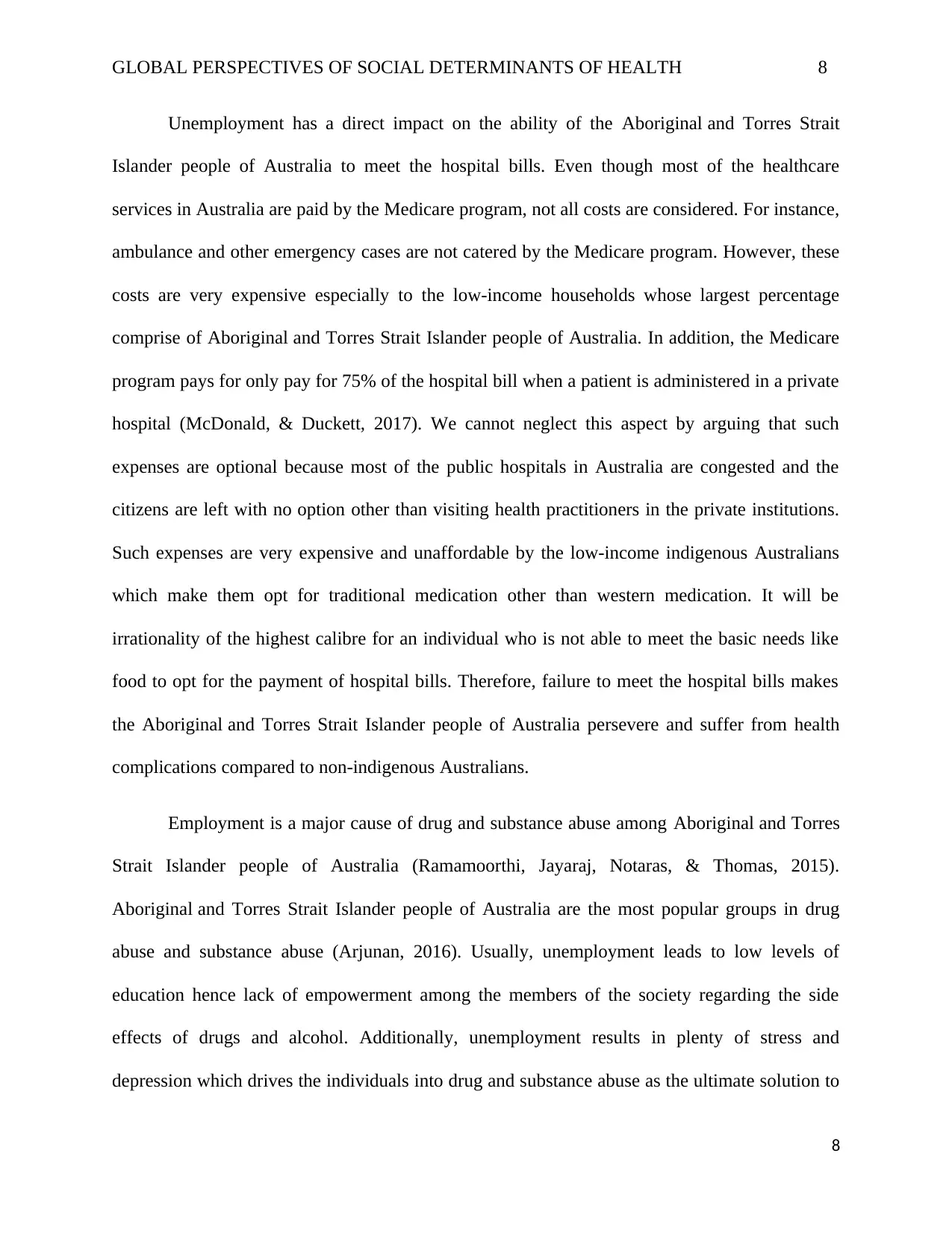
GLOBAL PERSPECTIVES OF SOCIAL DETERMINANTS OF HEALTH 8
Unemployment has a direct impact on the ability of the Aboriginal and Torres Strait
Islander people of Australia to meet the hospital bills. Even though most of the healthcare
services in Australia are paid by the Medicare program, not all costs are considered. For instance,
ambulance and other emergency cases are not catered by the Medicare program. However, these
costs are very expensive especially to the low-income households whose largest percentage
comprise of Aboriginal and Torres Strait Islander people of Australia. In addition, the Medicare
program pays for only pay for 75% of the hospital bill when a patient is administered in a private
hospital (McDonald, & Duckett, 2017). We cannot neglect this aspect by arguing that such
expenses are optional because most of the public hospitals in Australia are congested and the
citizens are left with no option other than visiting health practitioners in the private institutions.
Such expenses are very expensive and unaffordable by the low-income indigenous Australians
which make them opt for traditional medication other than western medication. It will be
irrationality of the highest calibre for an individual who is not able to meet the basic needs like
food to opt for the payment of hospital bills. Therefore, failure to meet the hospital bills makes
the Aboriginal and Torres Strait Islander people of Australia persevere and suffer from health
complications compared to non-indigenous Australians.
Employment is a major cause of drug and substance abuse among Aboriginal and Torres
Strait Islander people of Australia (Ramamoorthi, Jayaraj, Notaras, & Thomas, 2015).
Aboriginal and Torres Strait Islander people of Australia are the most popular groups in drug
abuse and substance abuse (Arjunan, 2016). Usually, unemployment leads to low levels of
education hence lack of empowerment among the members of the society regarding the side
effects of drugs and alcohol. Additionally, unemployment results in plenty of stress and
depression which drives the individuals into drug and substance abuse as the ultimate solution to
8
Unemployment has a direct impact on the ability of the Aboriginal and Torres Strait
Islander people of Australia to meet the hospital bills. Even though most of the healthcare
services in Australia are paid by the Medicare program, not all costs are considered. For instance,
ambulance and other emergency cases are not catered by the Medicare program. However, these
costs are very expensive especially to the low-income households whose largest percentage
comprise of Aboriginal and Torres Strait Islander people of Australia. In addition, the Medicare
program pays for only pay for 75% of the hospital bill when a patient is administered in a private
hospital (McDonald, & Duckett, 2017). We cannot neglect this aspect by arguing that such
expenses are optional because most of the public hospitals in Australia are congested and the
citizens are left with no option other than visiting health practitioners in the private institutions.
Such expenses are very expensive and unaffordable by the low-income indigenous Australians
which make them opt for traditional medication other than western medication. It will be
irrationality of the highest calibre for an individual who is not able to meet the basic needs like
food to opt for the payment of hospital bills. Therefore, failure to meet the hospital bills makes
the Aboriginal and Torres Strait Islander people of Australia persevere and suffer from health
complications compared to non-indigenous Australians.
Employment is a major cause of drug and substance abuse among Aboriginal and Torres
Strait Islander people of Australia (Ramamoorthi, Jayaraj, Notaras, & Thomas, 2015).
Aboriginal and Torres Strait Islander people of Australia are the most popular groups in drug
abuse and substance abuse (Arjunan, 2016). Usually, unemployment leads to low levels of
education hence lack of empowerment among the members of the society regarding the side
effects of drugs and alcohol. Additionally, unemployment results in plenty of stress and
depression which drives the individuals into drug and substance abuse as the ultimate solution to
8
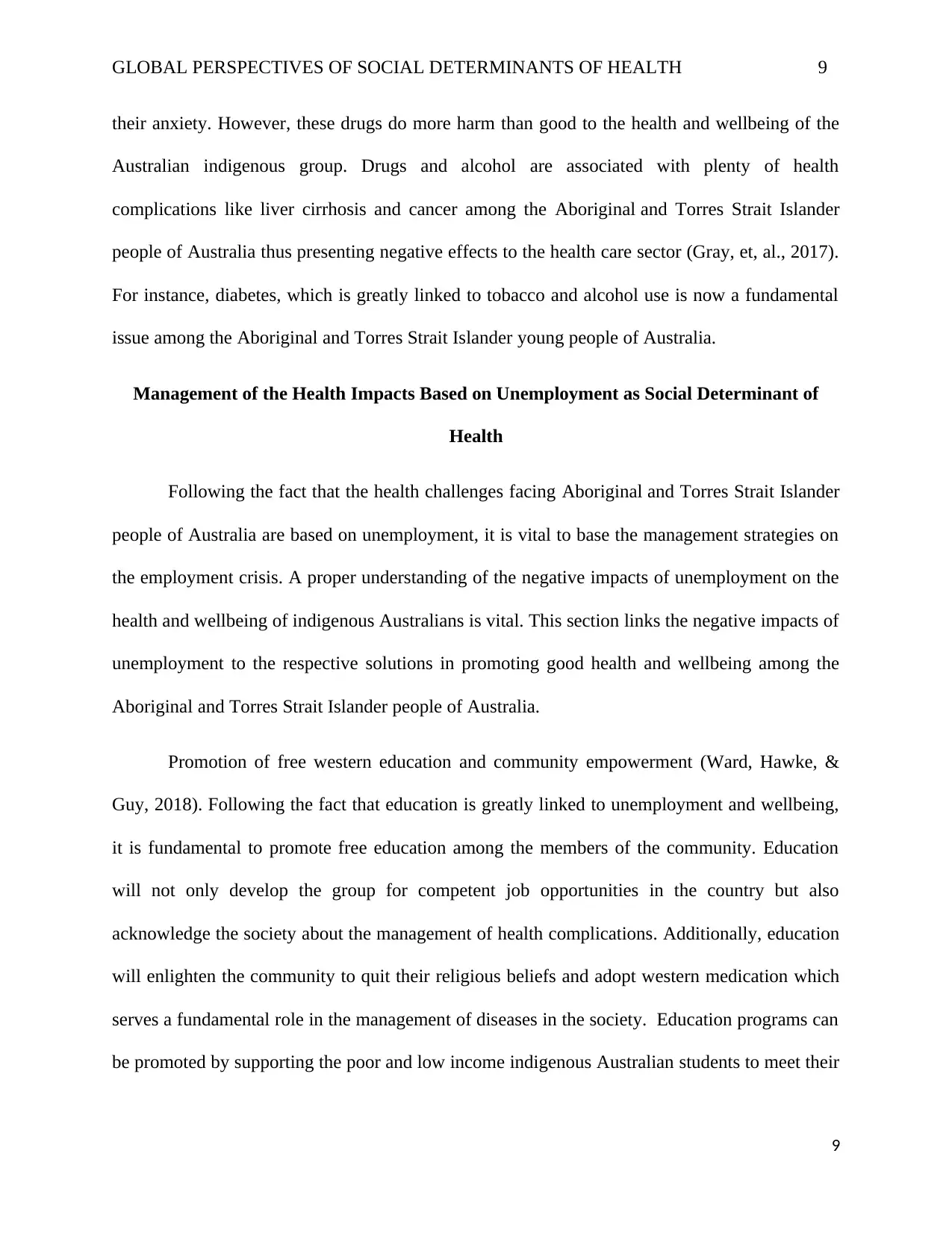
GLOBAL PERSPECTIVES OF SOCIAL DETERMINANTS OF HEALTH 9
their anxiety. However, these drugs do more harm than good to the health and wellbeing of the
Australian indigenous group. Drugs and alcohol are associated with plenty of health
complications like liver cirrhosis and cancer among the Aboriginal and Torres Strait Islander
people of Australia thus presenting negative effects to the health care sector (Gray, et, al., 2017).
For instance, diabetes, which is greatly linked to tobacco and alcohol use is now a fundamental
issue among the Aboriginal and Torres Strait Islander young people of Australia.
Management of the Health Impacts Based on Unemployment as Social Determinant of
Health
Following the fact that the health challenges facing Aboriginal and Torres Strait Islander
people of Australia are based on unemployment, it is vital to base the management strategies on
the employment crisis. A proper understanding of the negative impacts of unemployment on the
health and wellbeing of indigenous Australians is vital. This section links the negative impacts of
unemployment to the respective solutions in promoting good health and wellbeing among the
Aboriginal and Torres Strait Islander people of Australia.
Promotion of free western education and community empowerment (Ward, Hawke, &
Guy, 2018). Following the fact that education is greatly linked to unemployment and wellbeing,
it is fundamental to promote free education among the members of the community. Education
will not only develop the group for competent job opportunities in the country but also
acknowledge the society about the management of health complications. Additionally, education
will enlighten the community to quit their religious beliefs and adopt western medication which
serves a fundamental role in the management of diseases in the society. Education programs can
be promoted by supporting the poor and low income indigenous Australian students to meet their
9
their anxiety. However, these drugs do more harm than good to the health and wellbeing of the
Australian indigenous group. Drugs and alcohol are associated with plenty of health
complications like liver cirrhosis and cancer among the Aboriginal and Torres Strait Islander
people of Australia thus presenting negative effects to the health care sector (Gray, et, al., 2017).
For instance, diabetes, which is greatly linked to tobacco and alcohol use is now a fundamental
issue among the Aboriginal and Torres Strait Islander young people of Australia.
Management of the Health Impacts Based on Unemployment as Social Determinant of
Health
Following the fact that the health challenges facing Aboriginal and Torres Strait Islander
people of Australia are based on unemployment, it is vital to base the management strategies on
the employment crisis. A proper understanding of the negative impacts of unemployment on the
health and wellbeing of indigenous Australians is vital. This section links the negative impacts of
unemployment to the respective solutions in promoting good health and wellbeing among the
Aboriginal and Torres Strait Islander people of Australia.
Promotion of free western education and community empowerment (Ward, Hawke, &
Guy, 2018). Following the fact that education is greatly linked to unemployment and wellbeing,
it is fundamental to promote free education among the members of the community. Education
will not only develop the group for competent job opportunities in the country but also
acknowledge the society about the management of health complications. Additionally, education
will enlighten the community to quit their religious beliefs and adopt western medication which
serves a fundamental role in the management of diseases in the society. Education programs can
be promoted by supporting the poor and low income indigenous Australian students to meet their
9
⊘ This is a preview!⊘
Do you want full access?
Subscribe today to unlock all pages.

Trusted by 1+ million students worldwide
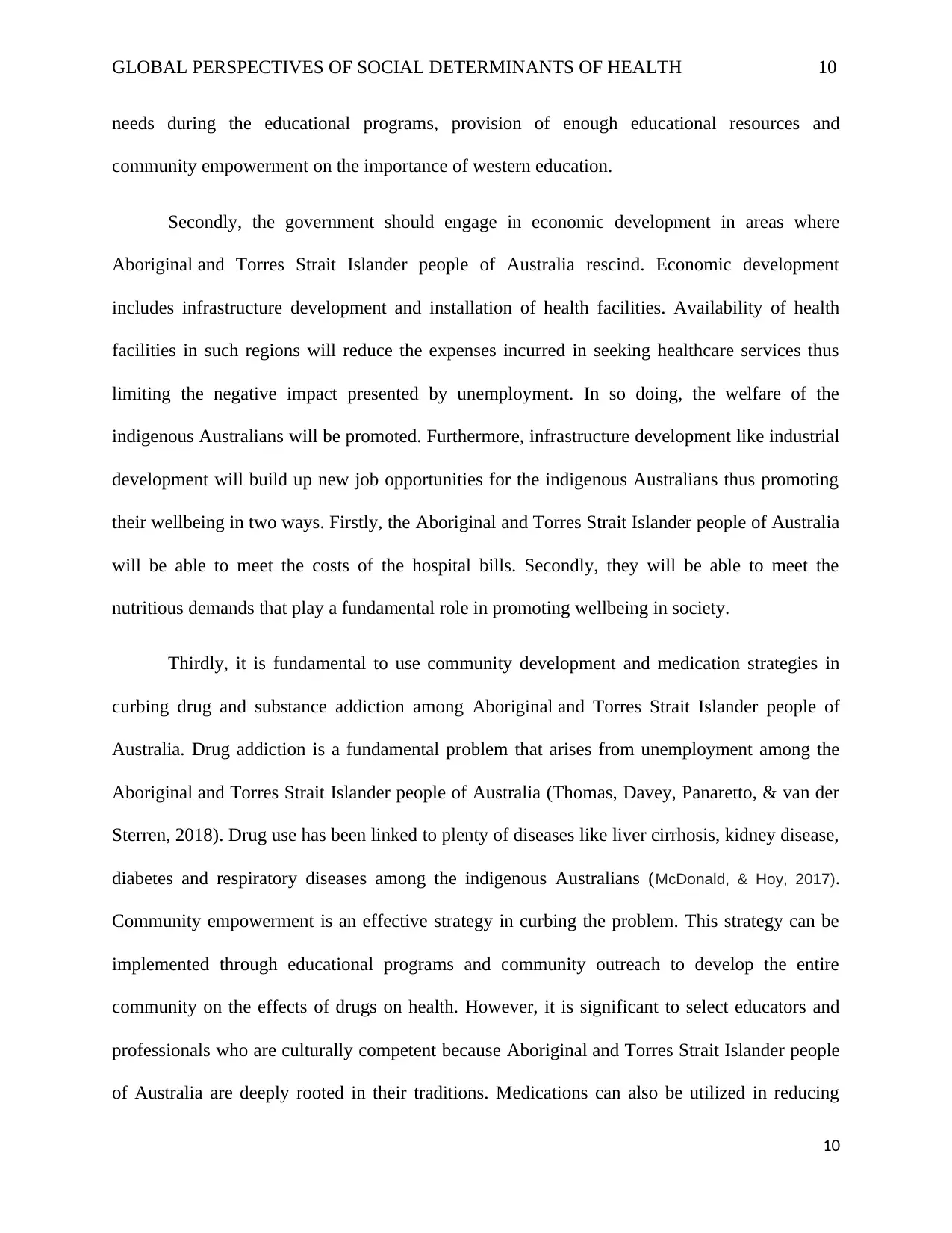
GLOBAL PERSPECTIVES OF SOCIAL DETERMINANTS OF HEALTH 10
needs during the educational programs, provision of enough educational resources and
community empowerment on the importance of western education.
Secondly, the government should engage in economic development in areas where
Aboriginal and Torres Strait Islander people of Australia rescind. Economic development
includes infrastructure development and installation of health facilities. Availability of health
facilities in such regions will reduce the expenses incurred in seeking healthcare services thus
limiting the negative impact presented by unemployment. In so doing, the welfare of the
indigenous Australians will be promoted. Furthermore, infrastructure development like industrial
development will build up new job opportunities for the indigenous Australians thus promoting
their wellbeing in two ways. Firstly, the Aboriginal and Torres Strait Islander people of Australia
will be able to meet the costs of the hospital bills. Secondly, they will be able to meet the
nutritious demands that play a fundamental role in promoting wellbeing in society.
Thirdly, it is fundamental to use community development and medication strategies in
curbing drug and substance addiction among Aboriginal and Torres Strait Islander people of
Australia. Drug addiction is a fundamental problem that arises from unemployment among the
Aboriginal and Torres Strait Islander people of Australia (Thomas, Davey, Panaretto, & van der
Sterren, 2018). Drug use has been linked to plenty of diseases like liver cirrhosis, kidney disease,
diabetes and respiratory diseases among the indigenous Australians (McDonald, & Hoy, 2017).
Community empowerment is an effective strategy in curbing the problem. This strategy can be
implemented through educational programs and community outreach to develop the entire
community on the effects of drugs on health. However, it is significant to select educators and
professionals who are culturally competent because Aboriginal and Torres Strait Islander people
of Australia are deeply rooted in their traditions. Medications can also be utilized in reducing
10
needs during the educational programs, provision of enough educational resources and
community empowerment on the importance of western education.
Secondly, the government should engage in economic development in areas where
Aboriginal and Torres Strait Islander people of Australia rescind. Economic development
includes infrastructure development and installation of health facilities. Availability of health
facilities in such regions will reduce the expenses incurred in seeking healthcare services thus
limiting the negative impact presented by unemployment. In so doing, the welfare of the
indigenous Australians will be promoted. Furthermore, infrastructure development like industrial
development will build up new job opportunities for the indigenous Australians thus promoting
their wellbeing in two ways. Firstly, the Aboriginal and Torres Strait Islander people of Australia
will be able to meet the costs of the hospital bills. Secondly, they will be able to meet the
nutritious demands that play a fundamental role in promoting wellbeing in society.
Thirdly, it is fundamental to use community development and medication strategies in
curbing drug and substance addiction among Aboriginal and Torres Strait Islander people of
Australia. Drug addiction is a fundamental problem that arises from unemployment among the
Aboriginal and Torres Strait Islander people of Australia (Thomas, Davey, Panaretto, & van der
Sterren, 2018). Drug use has been linked to plenty of diseases like liver cirrhosis, kidney disease,
diabetes and respiratory diseases among the indigenous Australians (McDonald, & Hoy, 2017).
Community empowerment is an effective strategy in curbing the problem. This strategy can be
implemented through educational programs and community outreach to develop the entire
community on the effects of drugs on health. However, it is significant to select educators and
professionals who are culturally competent because Aboriginal and Torres Strait Islander people
of Australia are deeply rooted in their traditions. Medications can also be utilized in reducing
10
Paraphrase This Document
Need a fresh take? Get an instant paraphrase of this document with our AI Paraphraser
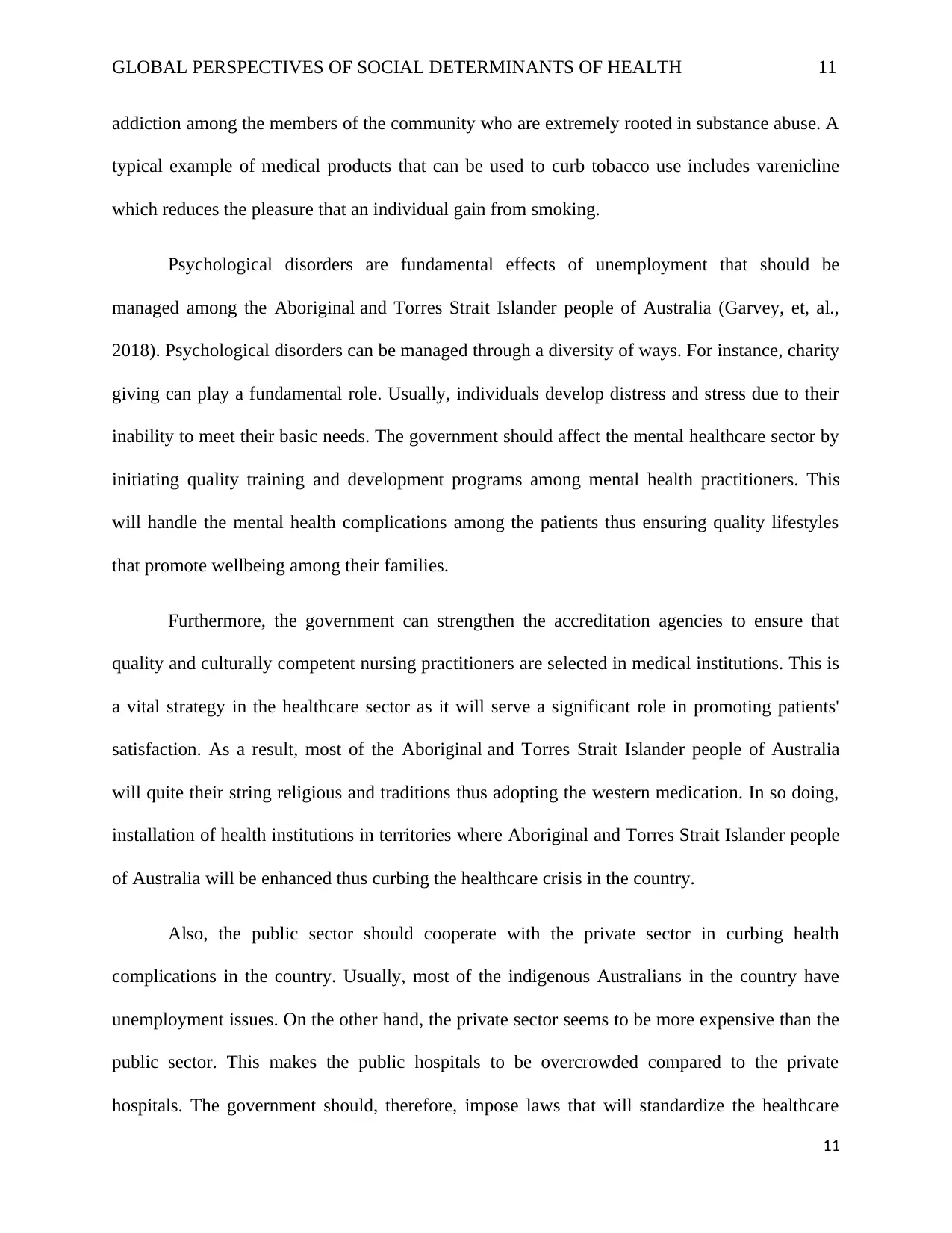
GLOBAL PERSPECTIVES OF SOCIAL DETERMINANTS OF HEALTH 11
addiction among the members of the community who are extremely rooted in substance abuse. A
typical example of medical products that can be used to curb tobacco use includes varenicline
which reduces the pleasure that an individual gain from smoking.
Psychological disorders are fundamental effects of unemployment that should be
managed among the Aboriginal and Torres Strait Islander people of Australia (Garvey, et, al.,
2018). Psychological disorders can be managed through a diversity of ways. For instance, charity
giving can play a fundamental role. Usually, individuals develop distress and stress due to their
inability to meet their basic needs. The government should affect the mental healthcare sector by
initiating quality training and development programs among mental health practitioners. This
will handle the mental health complications among the patients thus ensuring quality lifestyles
that promote wellbeing among their families.
Furthermore, the government can strengthen the accreditation agencies to ensure that
quality and culturally competent nursing practitioners are selected in medical institutions. This is
a vital strategy in the healthcare sector as it will serve a significant role in promoting patients'
satisfaction. As a result, most of the Aboriginal and Torres Strait Islander people of Australia
will quite their string religious and traditions thus adopting the western medication. In so doing,
installation of health institutions in territories where Aboriginal and Torres Strait Islander people
of Australia will be enhanced thus curbing the healthcare crisis in the country.
Also, the public sector should cooperate with the private sector in curbing health
complications in the country. Usually, most of the indigenous Australians in the country have
unemployment issues. On the other hand, the private sector seems to be more expensive than the
public sector. This makes the public hospitals to be overcrowded compared to the private
hospitals. The government should, therefore, impose laws that will standardize the healthcare
11
addiction among the members of the community who are extremely rooted in substance abuse. A
typical example of medical products that can be used to curb tobacco use includes varenicline
which reduces the pleasure that an individual gain from smoking.
Psychological disorders are fundamental effects of unemployment that should be
managed among the Aboriginal and Torres Strait Islander people of Australia (Garvey, et, al.,
2018). Psychological disorders can be managed through a diversity of ways. For instance, charity
giving can play a fundamental role. Usually, individuals develop distress and stress due to their
inability to meet their basic needs. The government should affect the mental healthcare sector by
initiating quality training and development programs among mental health practitioners. This
will handle the mental health complications among the patients thus ensuring quality lifestyles
that promote wellbeing among their families.
Furthermore, the government can strengthen the accreditation agencies to ensure that
quality and culturally competent nursing practitioners are selected in medical institutions. This is
a vital strategy in the healthcare sector as it will serve a significant role in promoting patients'
satisfaction. As a result, most of the Aboriginal and Torres Strait Islander people of Australia
will quite their string religious and traditions thus adopting the western medication. In so doing,
installation of health institutions in territories where Aboriginal and Torres Strait Islander people
of Australia will be enhanced thus curbing the healthcare crisis in the country.
Also, the public sector should cooperate with the private sector in curbing health
complications in the country. Usually, most of the indigenous Australians in the country have
unemployment issues. On the other hand, the private sector seems to be more expensive than the
public sector. This makes the public hospitals to be overcrowded compared to the private
hospitals. The government should, therefore, impose laws that will standardize the healthcare
11
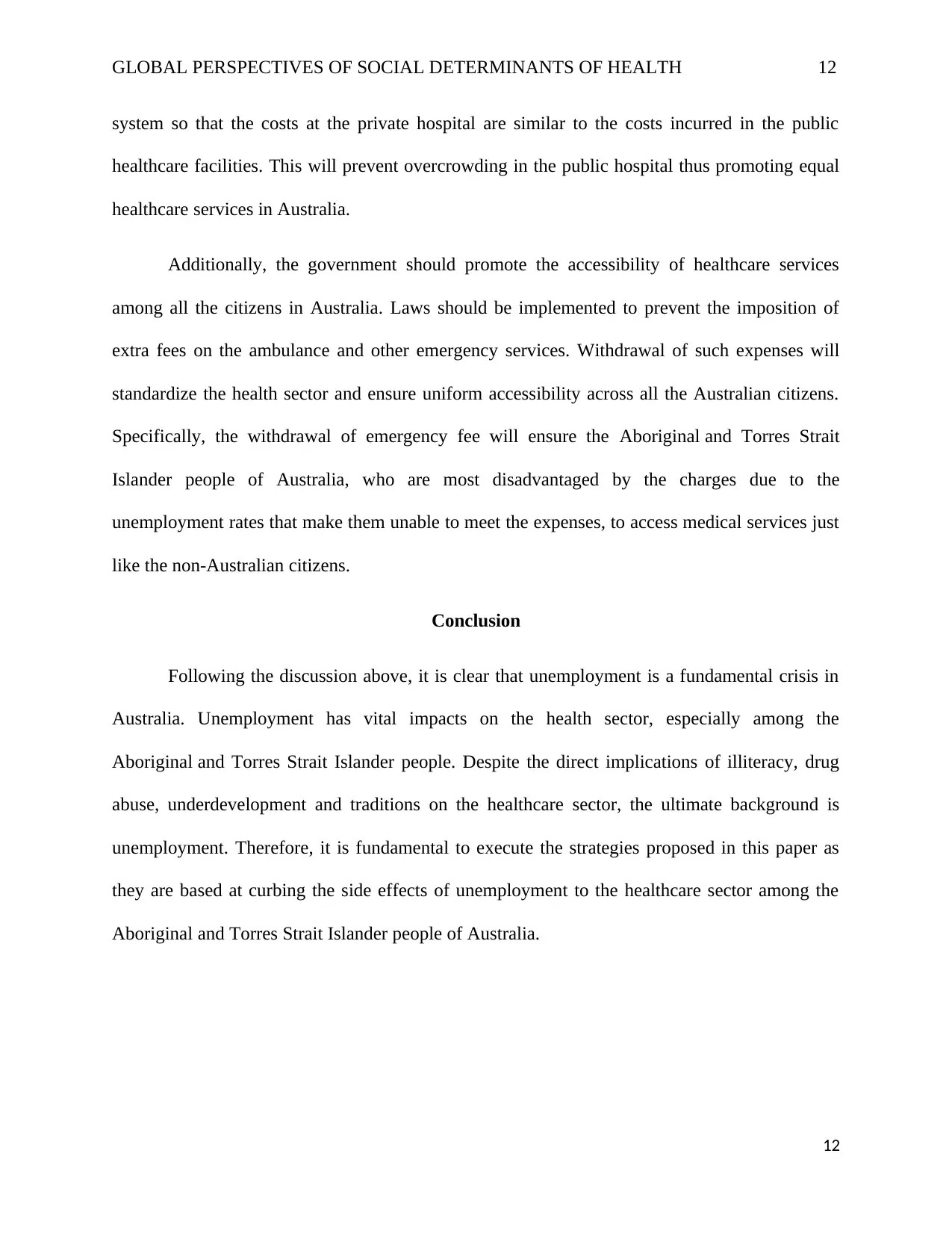
GLOBAL PERSPECTIVES OF SOCIAL DETERMINANTS OF HEALTH 12
system so that the costs at the private hospital are similar to the costs incurred in the public
healthcare facilities. This will prevent overcrowding in the public hospital thus promoting equal
healthcare services in Australia.
Additionally, the government should promote the accessibility of healthcare services
among all the citizens in Australia. Laws should be implemented to prevent the imposition of
extra fees on the ambulance and other emergency services. Withdrawal of such expenses will
standardize the health sector and ensure uniform accessibility across all the Australian citizens.
Specifically, the withdrawal of emergency fee will ensure the Aboriginal and Torres Strait
Islander people of Australia, who are most disadvantaged by the charges due to the
unemployment rates that make them unable to meet the expenses, to access medical services just
like the non-Australian citizens.
Conclusion
Following the discussion above, it is clear that unemployment is a fundamental crisis in
Australia. Unemployment has vital impacts on the health sector, especially among the
Aboriginal and Torres Strait Islander people. Despite the direct implications of illiteracy, drug
abuse, underdevelopment and traditions on the healthcare sector, the ultimate background is
unemployment. Therefore, it is fundamental to execute the strategies proposed in this paper as
they are based at curbing the side effects of unemployment to the healthcare sector among the
Aboriginal and Torres Strait Islander people of Australia.
12
system so that the costs at the private hospital are similar to the costs incurred in the public
healthcare facilities. This will prevent overcrowding in the public hospital thus promoting equal
healthcare services in Australia.
Additionally, the government should promote the accessibility of healthcare services
among all the citizens in Australia. Laws should be implemented to prevent the imposition of
extra fees on the ambulance and other emergency services. Withdrawal of such expenses will
standardize the health sector and ensure uniform accessibility across all the Australian citizens.
Specifically, the withdrawal of emergency fee will ensure the Aboriginal and Torres Strait
Islander people of Australia, who are most disadvantaged by the charges due to the
unemployment rates that make them unable to meet the expenses, to access medical services just
like the non-Australian citizens.
Conclusion
Following the discussion above, it is clear that unemployment is a fundamental crisis in
Australia. Unemployment has vital impacts on the health sector, especially among the
Aboriginal and Torres Strait Islander people. Despite the direct implications of illiteracy, drug
abuse, underdevelopment and traditions on the healthcare sector, the ultimate background is
unemployment. Therefore, it is fundamental to execute the strategies proposed in this paper as
they are based at curbing the side effects of unemployment to the healthcare sector among the
Aboriginal and Torres Strait Islander people of Australia.
12
⊘ This is a preview!⊘
Do you want full access?
Subscribe today to unlock all pages.

Trusted by 1+ million students worldwide
1 out of 16
Related Documents
Your All-in-One AI-Powered Toolkit for Academic Success.
+13062052269
info@desklib.com
Available 24*7 on WhatsApp / Email
![[object Object]](/_next/static/media/star-bottom.7253800d.svg)
Unlock your academic potential
Copyright © 2020–2026 A2Z Services. All Rights Reserved. Developed and managed by ZUCOL.





